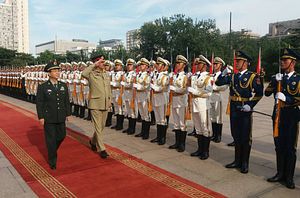A recent report about China trying to acquire a military base in Pakistan has created new concerns about Beijing’s long-term strategic plans in the Indian Ocean. The new base is supposed to go up in Jiwani, about 80 kilometers to the west of the better-known Gwadar port.
If China does establish a military base here, it will be its second foreign military base, after Djibouti, which was set up in August 2017. The Hambantota port in Sri Lanka given to China on a 99-year lease could possibly be added to the facilities available to China, though Sri Lanka has reportedly promised India that it will not allow the port to be used for military purposes.
All of this appears to fit with a concerted Chinese push to establish a long-term presence in Indian Ocean as well as to extend Beijing’s power projection capabilities. The proposed air and naval facility in Jiwani will come up next to Gwadar in Baluchistan, where China has already established what appears to be a long-term maritime presence. The new base is also fairly close to Chahabar port in Iran on the Gulf of Oman. Chahabar was jointly developed by Iran, India, and Afghanistan.
Gwadar is an important part of the China’s strategic plans, and it seems primarily to be driven by Beijing’s fear of a potential naval blockade of its sea lanes of communication (SLOCs). Irrespective of how serious such a threat of a blockade is, China has justified its interest in Gwadar as driven by its need for alternate shipping routes. More recently, China has linked its interest in Gwadar with the China-Pakistan Economic Corridor (CPEC), one of the vital corridors of Xi Jinping’s Belt and Road Initiative (BRI). Despite the insurrection in Baluchistan, in which both Gwadar and Jawani lie, China seems intent on doubling down on its Pakistan bet.
The Washington Times report, which originally reported on the base, indicated that a group of Chinese army officers met with Pakistan military officers in Pakistan to finalize the plans for the base. For Pakistan, this may be a knee-jerk reaction to the Trump administration’s policy of what Pakistanis consider the “abandonment” of Pakistan.
But if the reports are true, China clearly is looking at the longer term. This involves major upgrades of Jiwani airport so as to handle large Chinese military aircraft, with the airport renovation set to start in July this year. Establishing a joint naval and air base would mean relocating thousands of local Baluchis, which could create additional social and economic disturbances in the region and could further spur Baluchi unrest.
China, meanwhile, has officially called these reports as “unnecessary” and denied any plans to set up a military base in Pakistan. On the other hand, a Chinese military analyst, Zhou Chenming, claims that “China needs to set up another base in Gwadar for its warships because Gwadar is now a civilian port.” He added that “It’s a common practice to have separate facilities for warships and merchant vessels because of their different operations.
Merchant ships need a bigger port with a lot of space for warehouses and containers, but warships need a full range of maintenance and logistical support services.” But some Chinese analysts have questioned this logic. Lin Minwang of Fudan University, for example, has argued that the base “is unnecessary at this time,” suggesting that it will be needed only if Washington’s Indo-Pacific strategy gains traction.
Even as China has called these reports purely speculative, it is prudent to be assessing the strategic consequences of “Chinese militarization of Pakistan” and of the growing speed of Chinese outward expansion. The most important consequence is that it will add another dimension to the growing competition between India and China. China’s encirclement of India through its “string of pearls” has already been of concern but the recent Chinese proactive approaches in the Indian Ocean and Bay of Bengal are likely to heighten the concerns in New Delhi. This will lead to other spiraling effects: a more worried India is likely to get closer to the US and to other powers in Asia that also worry about China.
There is also the possibility of China getting embroiled in the Baluchistan rebellion, a consideration that Beijing simply does not appear to take very seriously. Finally, as the United States refocuses attention on “great power conflict,” as has been referred to in strategic documents released by the Trump administration over the past few months, China’s expanding footprint seems to underscore the necessity for the shift in American grand strategy.

































